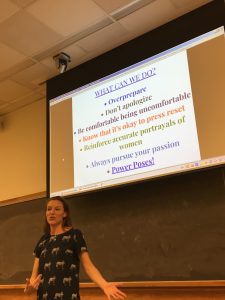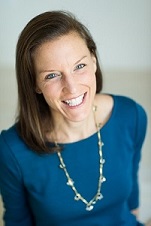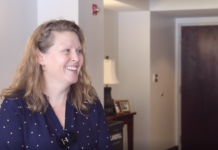 Last Tuesday, Media Studies professor Anna Katherine Clay gave a presentation entitled “Besting Bias and Blazing Trails: How to Navigate Today’s Media Landscape as Strong, Fearless Women.” As a former full-time sports reporter for ESPN and a regular ESPN contributor today, Clay spoke about her time in the field and the gender biases she and other women in sports journalism so often face.
Last Tuesday, Media Studies professor Anna Katherine Clay gave a presentation entitled “Besting Bias and Blazing Trails: How to Navigate Today’s Media Landscape as Strong, Fearless Women.” As a former full-time sports reporter for ESPN and a regular ESPN contributor today, Clay spoke about her time in the field and the gender biases she and other women in sports journalism so often face.
Clay started the talk by recounting her experience growing up as a young girl in Chapel Hill, N.C., which – as can be assumed – consisted of going to many University of North Carolina basketball games. It was here that she says she gained an immense appreciation for the unity that so many sports foster.
She remembered “just loving, not necessarily the nuts and bolts of basketball, but the way sports bring people together.” Even as a young girl, Clay knew that there was something special about what she was watching.
“You can be the mayor of your town, or you can be homeless sitting outside of the arena,” she said. “But you can all cheer for a team with the same passion and the same fervor. I loved that about sports.”
But it did not take long for Clay to realize that pursuing sports journalism would mean dealing with sexism and bias – obstacles that she, while daunted, was ready to tackle.
“A big reason I actually wanted to go into sports journalism was because there weren’t a lot of females, particularly in writing…” she noted. “I liked that challenge.”
According to Clay, being a woman in sports media came with came with more than just the obvious hurdles: one major one being the men’s locker room.
“You interview athletes before or after in the locker room. The athletes are often in various shades of undressed because they let you either when they have just showered or when they are about to shower. This is how it’s always been, but again this industry was started by men,” she said.
On her first assignment after grad school, a young Clay traveled to interview Boston Red Sox players. She remembered looking around at 28 reporters and noticing that she was the only woman (and the youngest person by at least a decade). Unfortunately for her, one of the Red Sox players had also taken notice.
He “was walking by with his towel on, and he sees me, redirects his path, stands right up close to me, drops his towel, and says, ‘welcome to the major leagues,’” she explained to a laughing audience.
As uncomfortable as she was in the moment, Clay says she decided that she was there for a purpose and would not be intimidated.
“That was when I learned my first lesson that I always tell my sports journalism class, which is you’re always over prepared, you’re always professional, and you always stay focused on your assignment… There are men who are going to try to intimidate you or consider you inferior,” she said. “When you can prove how knowledgeable you are and how prepared professionally you are they can’t really answer to that except to respect you.”
The UVa professor noted a growing need for media consumers to recognize how low numbers of women in sports media are echoed by low numbers of women in the media in general.
According to Clay, women hold a substantially smaller percentage of the voice in all media, but particularly when it comes to her career field. She explained, “The worst is my industry, sports. Women have 11 percent of the voice as compared to 89 percent for men.”
Expanding to all fields, Clay pointed out that widespread biases against women go beyond media careers to actual media products like Victoria’s Secret and Brawny paper towel advertisements, and further into the fields of technology and finance.

“Women are only one fourth of creators, directors, writer, producers, and editors working across the media… We’ve seen with the ‘Me Too’ movement that this isn’t just media,” she said. “It’s politics, it’s education, it’s tech, it’s business, it’s academia, it’s everywhere.”
Clay emphasized, however, that this division in representation should never discourage women. Regardless of the industry, “If there aren’t a lot of women, it shouldn’t hold you back. If anything, that should inspire you to continue trying and to keep moving forward.”
















